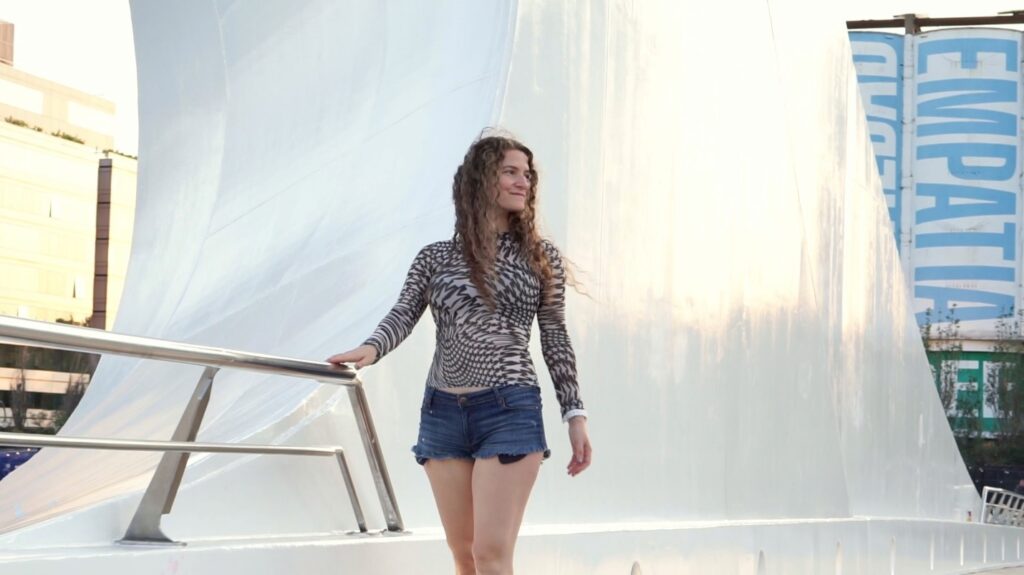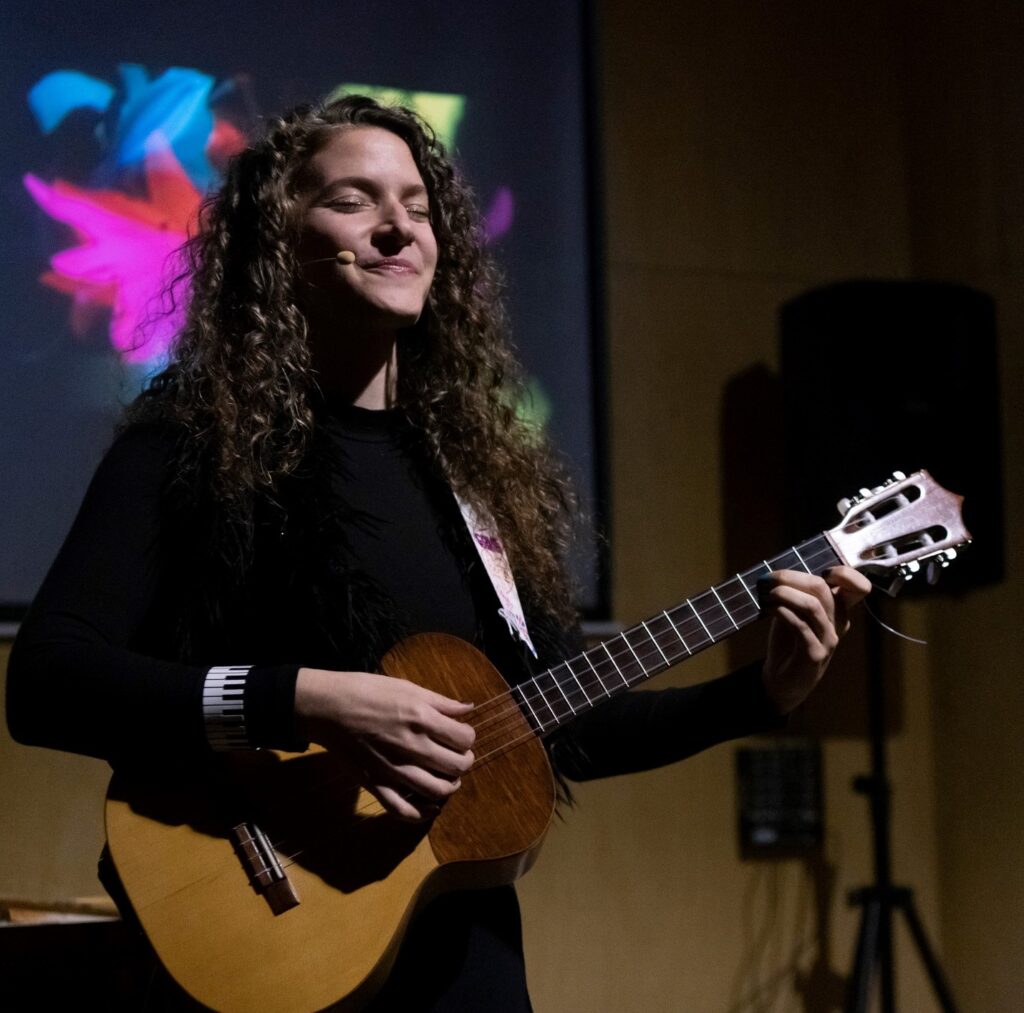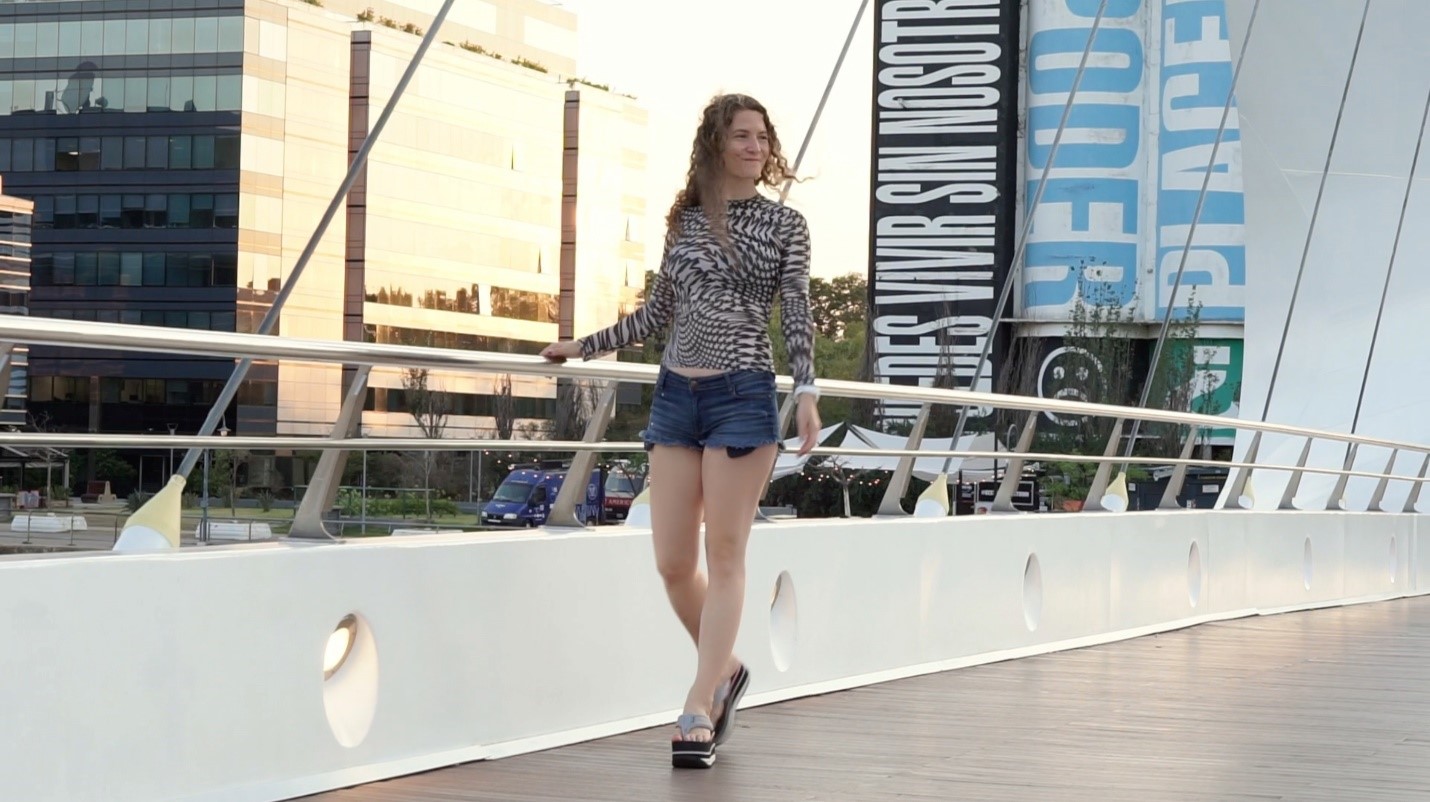Mariana Masetto, who was born in Buenos Aires, Argentina, is a musician, singer, percussionist, writer, and educator. She has released eight albums and a single: La Bumbunita 2010; Soy libre, 2012; Mientras viva yo iré cantando, 2014; and Ela e o mar, Narciso, a 7″ vinyl, 2016, Abro 2018 and Je ne pense qu´à toi 2020. Soy libre was nominated for the 2013 Carlos Gardel Award for Best New Folklore Artist Album and the 13th Independent Music Award for Best World Beat Album. “Solcito” was nominated for Best Global Beat Song at the 14th Independent Music Awards in 2015. In 2016, her song “Jaguar del monte” was nominated for the 15th Independent Music Awards in the same category. In 2017, she mastered her song “Encuentro” at the Abbey Road Studio alongside Ariel Gato and famous mastering engineers Miles Showell and Alex Gordon. At the 16th Independent Music Awards in 2018, her song “Agua del Cerro” was nominated in the same category. In 2022, she released Ciclo.
From her ninth album, Yendo is a new song filmed in the woman bridge with a mix of Spanish and French discussing the development of a woman’s life nowadays. The YouTube video includes subtitles to get the message across for listeners who don’t speak the aforementioned languages. Check out the song and the exclusive interview below:

1. Can you tell us a bit about where you come from and how it all got started?
MARIANA MASETTO: I come from Buenos Aires, Argentina. My artistic career began 10 years ago, I was interested in percussion as an expressive language and at the same time I began to like singing while making rhythm with drums. This is how I recorded my first solo album, La Bumbunita, the name of a characteristic dove in Argentina. Later on, I gave this name to my own recording label, with which I have been publishing my music up to the present day.
2. Did you have any formal training or are you self-taught?
MARIANA MASETTO: I have training in percussion and singing. I am an autodidact on the cuatro, which is the other 4-string instrument that is my partner today. Regarding singing, I’ve developed my own method of singing combined with yoga, unique in the world. During the performance of yoga postures, vocalisations are made which tune up the whole body. The method is called “Our voice has body”. It is available worldwide on Amazon in 3 languages.
3. Who were your first and strongest musical influences and why the name ‘MARIANA MASETTO’?
MARIANA MASETTO: My first influences were Bob Marley, Argentinean bands that also played rock and reggae, such as Los Cafres, and I also started to listen to North American groups. Then my tastes moved on to what are my favourites today, like Paul McCartney, Sting, Peter Gabriel or Harry Styles. Mariana Masetto is my own name.
4. What do you feel are the key elements in your music that should resonate with listeners, and how would you personally describe your sound?
MARIANA MASETTO: The elements that I take with me to create my songs today are based on the observation of the personal consciousness in relation to the world, to the nature that surrounds us. This is also the reason why in my last songs I have integrated its video as an arrangement. In the end it becomes a whole together with the song. The special sound of this next coming album that I’m developing is to integrate two different languages in each lyrics. It happens to us today when we travel around the world. In every place at least two languages are spoken and we have to try to interact with them. I have also studied different languages to be able to show and share my own method of singing “Our Voice Has Body” in English, Portuguese and French. So every lyric of this album is a mixture of Spanish + English, Spanish + French and so on.

5. For most artists, originality is first preceded by a phase of learning and, often, emulating others. What was this like for you? How would you describe your own development as an artist and music maker, and the transition towards your own style, which is known as POP?
MARIANA MASETTO:
I began to sing arrangements of folk songs from my own country, some from Latin America as well as from Africa, with just my voice and percussion. As time went by I had more and more contact with other horizons. Moving my body through yoga also broaden my horizons and of course there was a change in listening to music around the world and I had more access to it. There I started to integrate other rhythms into my music and finally added the cuatro as a harmonic instrument, using it to make music that was not designed for that instrument. I was interested in its sound, it was the completion of a harmonic part that led me to the composition of songs with the cuatro + percussion. In addition, there was my curiosity to travel and some visits to different places, not only in my country, but also around the world. These places were and still are permanent triggers for my music. Every context, every sound spoken, every bird that flies ends up drawing lyrics in my head. Then the rhythm comes into my head, the melody comes into my head and from there the new song comes.
6. What’s your view on the role and function of music as political, cultural, spiritual, and/or social vehicles – and do you try and affront any of these themes in your work, or are you purely interested in music as an expression of technical artistry, personal narrative, and entertainment?
MARIANA MASETTO:
My songs have the aim to make you aware, to show my interest in nature, to make you more aware of it and its value. To make you know that life is not forever and that we have to live each day as if it were our most important day, so that tomorrow we can go on living in the same way. Naturally, I have beauty as a leitmotif, and I have my way of doing it with my tunes, my images and nature. My last album “Ciclo”, for example, ended up being almost a film in itself, that’s how it was finally uploaded to Youtube as a whole. It has 9 songs in 9 beautiful places in my country and Uruguay, as well as some little flashes from my trips to the UK and Brazil.
7. Do you feel that your music is giving you back just as much fulfillment as the amount of work you are putting into it or are you expecting something more, or different in the future?
MARIANA MASETTO:
Music makes me very happy, I started making music because I love making music, because it’s the language that allows me to be the way I am, I like singing. If this beautiful work that I’m doing turns into something bigger, it will be to make more and more music and more trips to spread my music all over the world.
8. Could you describe your creative processes? How do usually start, and go about shaping ideas into a completed song? Do you usually start with a tune, a beat, or a narrative in your head? And do you collaborate with others in this process?
MARIANA MASETTO:
It all starts with an image, a place, an action, even something surprising in relation to a different place, that triggers a story, an idea or even a descriptive phrase. Then with that image comes the rhythm, with which I debate in different directions until the same image gives me its rhythm, from there the melody comes, and then the lyrics that are linked to that phrase and that initial melody. I do all this work together with my partner Ariel Gato, with whom I go on in these trips, and we talk about these ideas, kneading them as if they were a delicious meal to be tasted later. Ariel is a sound engineer and he is the one who makes the musical ideas that the two of us have come to life.
9. What has been the most difficult thing you’ve had to endure in your life or music career so far?
MARIANA MASETTO:
The transition from the making of traditional music to the feeling of acceptance from the audience. When I started making my own music I wasn’t so accepted at first, but listening to my own music made me so happy that it gave me the strength to continue, and of course the audience listening to me now is much bigger and more diverse. This process has helped me so much!
10. On the contrary, what would you consider a successful, proud or significant point in your life or music career so far?
MARIANA MASETTO: I was very lucky to be nominated in my country’s main music award “Gardel Award” for Best New Folklore Artist and for the “Independent Music Awards” in USA for the same album “Soy Libre”. I also had the great opportunity to master my 5th album at Abbey Road Studios and to get to know this beautiful cathedral of music and to work there with wonderful engineers. Last but not least, I am also very lucky to be able to share with my partner the music that we are building together.
11. With social media having a heavy impact on our lives and the music business in general, how do you handle criticism, haters, and/or naysayers in general? Is it something you pay attention to, or simply ignore?
MARIANA MASETTO: I understand that it’s a great tool and it’s important to use it effectively, but I don’t spend time thinking about the comments. I appreciate the good, and I appreciate the bad too, because it’s somebody else that’s seen or listened to what I’ve done. But I am very grateful to see them. You never know what path a song is going to take when it goes out into the world, and that’s the good thing about it nowadays. When I started making music, I only depended on my peers in my country and maybe neighbouring countries. Today, the dimension has completely changed, which gives me an enormous opportunity. As far as those who hate are concerned, I think they are just feeding on something that only makes them worse. Even though it feeds them, it is more of a way for us to move forward, than the control of their own fear.
12. Creative work in a studio or home environment, or interaction with a live audience? Which of these two options excites you most, and why?
MARIANA MASETTO: Let’s have a look, they are so different emotions. They both tempt me and I have time for each of them, they are fascinating to me, as well as the process, in this order, of first creating the music that fascinates me, feeds me, drives me and changes me! Then, with all these creations, I am excited to see the listeners’ faces when they hear what they may have already heard on Spotify or YouTube, but in a live version that will always be different and that is my fascination.
13. Do you think is it important for fans of your music to understand the real story and message driving each of your songs, or do you think everyone should be free to interpret your songs in their own personal way?
MARIANA MASETTO: I’m fascinated that each listener feels triggered in their own thinking and creates their own version of the story. Although many songs are specific, I understand that everyone will always be different. I love that about human beings. Diversity builds and strengthens! And I love to receive messages from those, who sometimes tell me that they have been listening to one of my songs, for example, and it has given them a feeling of peace, of tranquillity, or has made them think. That freedom is very good for me.
KEEP IN TOUCH:
FACEBOOK | INSTAGRAM | TWITTER | SPOTIFY | BANDCAMP | WEBSITE | YOUTUBE

Photo credits: Ariel Gato

